
As the Universal Declaration of Human Rights states, all people possess human rights and fundamental freedoms that governments must protect. The government of the People’s Republic of China (PRC), guided by a totalitarian ideology under the absolute rule of the Chinese Communist Party (CCP), deprives citizens of their rights on a sweeping scale and systematically curtails freedoms as a way to retain power. People in China cannot practice the religion or belief of their choice. They cannot express their opinions openly or form or join groups of their choosing without fear of harassment, arrest, or retribution. Members of minority groups are subject to mass arbitrary detention, Orwellian-style surveillance, political indoctrination, torture, forced abortions and sterilization, and state-sponsored forced labor.
Watch
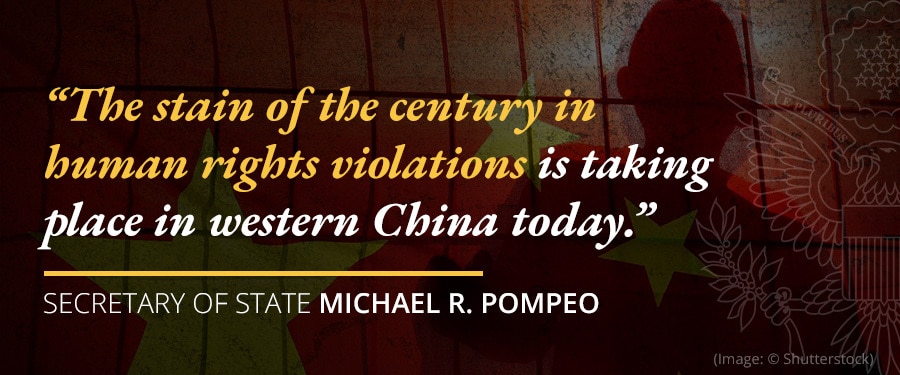
Repression in Xinjiang
The PRC has taken its decades-long repressive policies in Xinjiang to the extreme since April 2017, detaining more than one million Uyghurs, ethnic Kazakhs and Kyrgyz, and members of religious minority groups in internment camps in a systematic effort to eradicate their ethnic and cultural identity and religious beliefs, and control their population growth. Countless publicly available reports of torture, rape, forced ingestion of drugs, sexual assault and other horrific abuses occurring in these camps have been documented based on the experiences of those who have escaped. Outside the camps, the CCP’s repression of minorities includes coercive practices such as pervasive surveillance and involuntary mass collection of biometric data from innocent civilians, state-sponsored forced labor, and compulsory stays by CCP officials in Uyghur homes intended to prevent the observance of religious practices. Members of these minority groups are forcibly relocated to camps and factories and required to renounce their ethnic identities, religious beliefs, and cultural and religious practices. In addition, children are removed from their families and forced into state-run indoctrination facilities. Women and girls are routinely subject to forced marriages and other abuses, including forced abortion, forced sterilization, and involuntary birth control implantation. Leaked government documents corroborate the coercive nature of these camps and the CCP’s systematic campaign against these men, women, and children.
Watch
read more

Xinjiang
What’s Happening in Xinjiang?
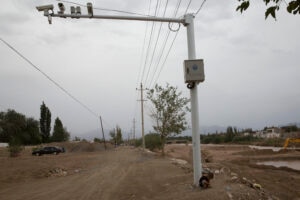
Article
China’s Surveillance State: An Open-Air Prison in Xinjiang

Fear of Arbitrary Arrest
The CCP has absolute control over law enforcement and the judicial system, and it uses both to stifle calls from Chinese citizens for freedom, human rights, and rule of law. Authorities regularly detain those who do not conform to CCP ideology. Those brave enough to speak out are often subject to prolonged and secret detention without access to legal counsel or the ability to communicate with their families. Lawyers, human rights activists, intellectuals, journalists, religious leaders, religious adherents, and ethnic and religious minorities are frequent targets, accused of vaguely worded charges that imply treason and subversion. These arrests and the fear they instill are tools in the CCP’s effort to maintain unchallenged power over people.
Watch
read more

report
2019 Report on Human Rights Practices in China
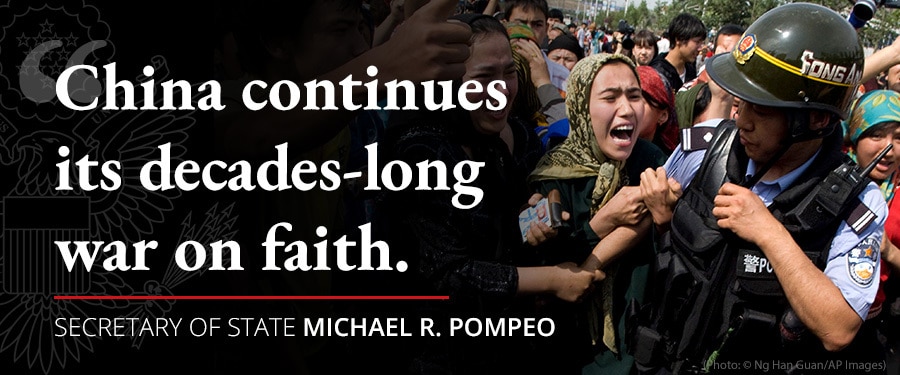
Religious Freedom Abuses
The PRC government is one of the worst abusers of religious freedom in the world and is openly hostile to members of all religious faiths, including Uyghur Muslims, Tibetan Buddhists, Christians, and Falun Gong practitioners. The PRC has adopted a five-year plan to bring all religious doctrine and practice in line with Communist Party doctrine. This effort calls for rewriting holy texts, forbidding youth from participating in religious activities, and implementation of mass detention camps that indoctrinate detainees in CCP ideology and force renunciation of faith. Leaked PRC government documents show use of “religion-related reasons” such as men wearing beards, women wearing veils, and families having too many children as justification to detain Uyghur Muslims and impose further ideological control on the Chinese population.
The CCP also insists it has the authority to select Tibetan Buddhist lamas, including the next Dalai Lama, and considers house churches and Falun Gong adherents and their practices to be “illegal” if they refuse to join CCP-led organizations or renounce important elements of their beliefs. Authorities routinely shutter or demolish houses of worship and offer cash rewards to those who inform on religious adherents. Individuals found violating the laws and regulations controlling religion are harassed, surveilled, interrogated, arrested, beaten, sentenced to prison, detained, or disappeared.
Watch
read more

Remarks
The CCP’s Violations of Religious Freedom
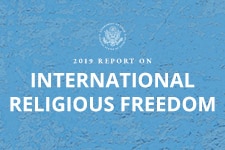
Report
2019 Report on International Religious Freedom: China

Remarks
Remarks on Religious Freedom
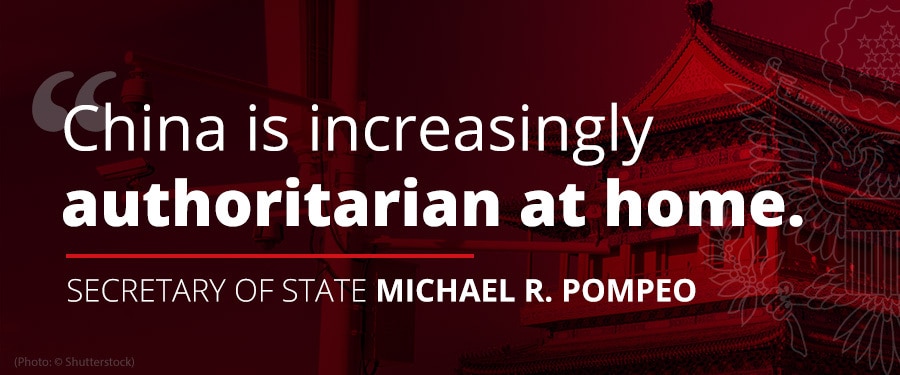
Stifling Freedom of Expression
The PRC government strictly controls what information is available on the internet within China. Further, the PRC controls all domestic news reporting through direct ownership of news outlets. Daily CCP directives compel Chinese media to report on specific issues and perspectives, ensuring that only information matching the government’s desired narrative is shared. Government control of the telecommunications infrastructure enables the blocking of websites, and mass deletion of microblog posts, instant messages, and user accounts that touch on banned political, social, economic, and religious topics. Thousands of websites are blocked in China, including major news and social media hubs like Google, YouTube, Twitter, and Facebook. The Chinese people lack access to dissenting views, and the fear of severe punishment deters those who want to speak out, imposing a nationwide culture of self-censorship.
Watch
read more

speech
Communist China and the Free World’s Future
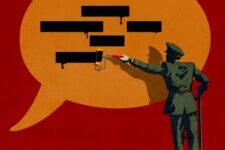
article
In China, You Can’t Say These Words

article
Why Is China So Afraid of a Free Press?

Article
Chinese Censorship Is a Global Problem

Forced Labor
Labor laws in China do not allow for freedom of association, which is a core labor standard. Independent unions are illegal in China and employers are under no obligation to bargain with workers in good faith. The effects on workers are severe: Occupational safety and health violations are prevalent, with limited enforcement and recourse for workers who find themselves in dangerous working conditions. Workers are frequently not paid in many industries. Workplace discrimination is rampant, including recruitment practices that explicitly reference gender, age, disability, physical appearance, and marital status. In the Xinjiang Uyghur Autonomous Region, state-sponsored forced labor remains a significant part of the CCP’s campaign of repression against Uyghurs and members of other Muslim minority groups. The PRC subsidizes Chinese companies to set up factories near detention camps in Xinjiang and transfers camp victims and others from rural areas to factories in other parts of Xinjiang and throughout China to work as forced labor under the guise of “vocational training” and “poverty alleviation” programs.
read more

article
New Reports Find Widespread Forced Labor in China

Article
U.S. Warns of Business Risks from China’s Abuses

collection
Xinjiang Supply Chain Business Advisory

Article
China’s Forced Labor Campaign in Xinjiang
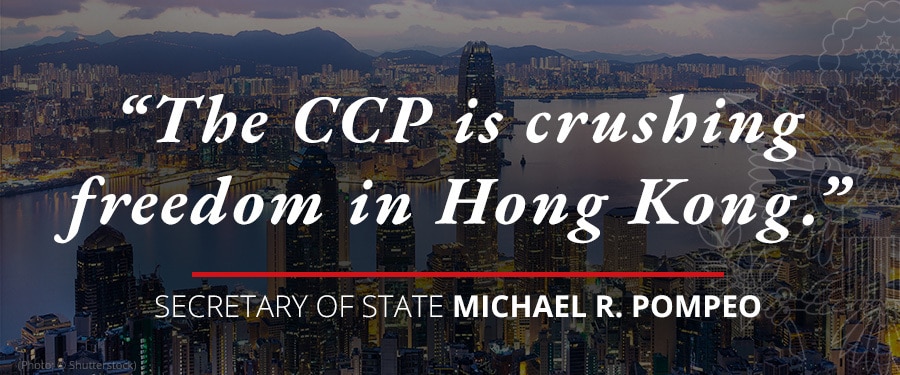
Assault on Hong Kong’s Autonomy
In 1997, the PRC promised the people of Hong Kong at least 50 years of autonomy and a system in which they could choose their leaders. These promises are enshrined in Hong Kong’s Basic Law and the UN-registered Sino–British Joint Declaration. A mere two decades later, the CCP broke these promises. The Government of Hong Kong has: announced the postponement of Legislative Council elections for at least a year; enacted draconian national security legislation that provides for up to life in prison for the ambiguously defined crimes of secession, subversion, terrorism, and collusion with foreign powers (and which lawmakers were forced to vote on without the ability to debate its provisions); and created new national security institutions with limited oversight that are designed to eliminate challenges to the PRC government, including peaceful protests. Authorities are removing books critical of the CCP from bookstore and library shelves, banning democratic political slogans, and requiring schools to enforce censorship of teachers and students. What made Hong Kong flourish—freedom—is being destroyed and its autonomy eviscerated. Beijing’s broken promises undermine the human rights, fundamental freedoms, and dignity of the people of Hong Kong.
Watch
read more

media note
Joint Statement on the Erosion of Rights in Hong Kong
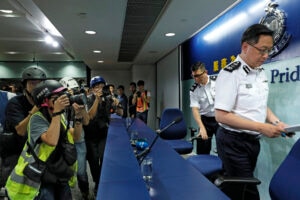
Article
U.S. Sanctions Leaders of China’s Hong Kong Crackdown
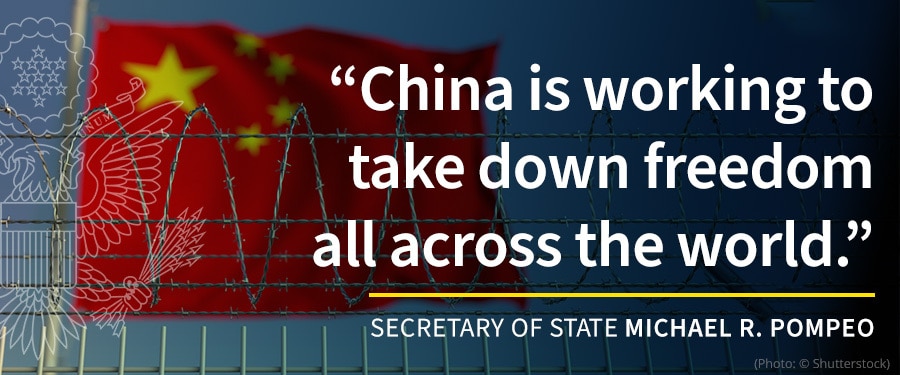
Severe Restrictions in Tibet
The PRC is continuing its decades-long campaign to eradicate Tibet’s unique religious, ethnic, cultural, and linguistic identity. Tibetans live in a virtual police state and face severe restrictions of their human rights and fundamental freedoms, including freedom of religion or belief. The PRC interferes in the selection, education, and veneration of Tibetan Buddhist religious leaders and has evicted thousands of monks and nuns from religious institutions while destroying their dwellings. The PRC government has refused repeated requests to hold a meaningful and direct dialogue with the Dalai Lama or his representatives without preconditions. Instead, it has cut off the Tibetan community from the rest of the world, including by systematically impeding access to the region for foreign diplomats, journalists, and tourists.
read more
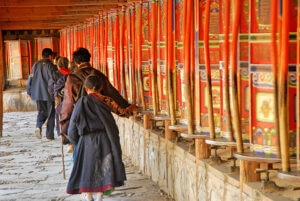
press statement
Implementing Visa Restrictions Under the Reciprocal Access to Tibet Act

report
Report to Congress on Access to Tibetan Areas of the PRC
More on China’s Human Rights Abuses
Video | The Chinese Communist Party’s Abuses in Xinjiang | september 9, 2020
Video | UN Members Condemn China’s Human Rights Abuse | NOV 6, 2019
Video | Life as a Uyghur Student in Xinjiang | June 18, 2020
Video | What Does a Million Look Like? | july 14, 2020






